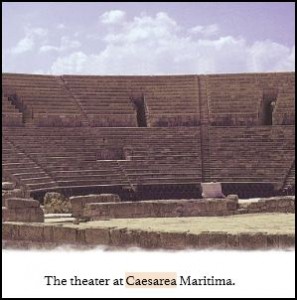The first site we’ll visit will be the ruins along the Mediterranean Coast at Caesarea. This site was built primarily by Herod to honor his patron, Caesar  Augustus. After AD 6, it became the official residence of the Roman procurators and the center of Roman administration in Palestine. It is most likely the spot where Paul stood, possibly in this amphitheatre before Felix, Festus and even Herod himself.
Augustus. After AD 6, it became the official residence of the Roman procurators and the center of Roman administration in Palestine. It is most likely the spot where Paul stood, possibly in this amphitheatre before Felix, Festus and even Herod himself.
Herod’s kingdom lacked a deep water port that could accommodate the larger Roman cargo vessels so he had engineers expand an ancient Phoenician port into a large harbor facility. This was an unprecedented effort. As a modern trading port it turned Caesarea into a major commerce center, but also a center for a plethora of vile religious expressions. In one of the warehouses, excavators discovered a Mithraeum—a place imitating a cave where the god Mithras was worshiped in secret ceremonies—complete with an altar and a medallion depicting Mithras slaying a bull. A temple to Roma and Augustus stood high on a raised platform east of the harbor. Although there was a Jewish community here, it was thoroughly a Hellenistic- Roman city with a large garrison of Roman soldiers.
The most interesting biblical account related to this site is found in Acts 10. It begins, “At Caesarea there was a man named Cornelius, a centurion of what was known as the Italian Cohort.” The story proceeds to tell us that God sent an Angel to him to send for man staying with Phillip the Tanner in Joppa. Cornelius sends two soldiers to get Peter. In the meantime, God is preparing Peter for the arrival of these filthy pagans. On a rooftop in Joppa, Peter became hungry and in a dream, a sheet descends filled with vile, disgusting creatures forbidden by the law to consume. God tells him to eat! But, no, Peter won’t defile himself. But after three times, God commands Peter not to call “unclean” that which He has declared “clean.” Peter is studying on this when the soldiers from Caesarea arrive. And they said, “Cornelius, a centurion, an upright and God-fearing man, who is well spoken of by the whole Jewish nation, was directed by a holy angel to send for you to come to his house and to hear what you have to say…The next day he rose and went away with them, and some of the brothers from Joppa accompanied him.”
Peter may have planted a Church here. I’m guessing, but the early Church Fathers, Origen and Eusebius, were profoundly influenced by Peter’s teachings. They taught and wrote from their residence in Caesarea.
Chuck
“But the voice spoke again: Do not call something unclean if God has made it clean.” Acts 10:15